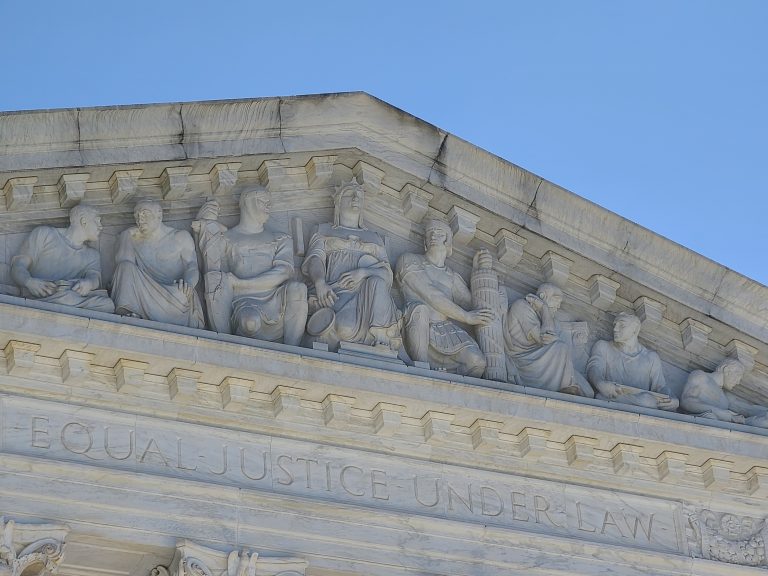New York’s restrictive gun-carry licensing scheme violates the Second Amendment.
That’s the ruling of the Supreme Court in New York State Rifle and Pistol Association (NYSRPA) v. Bruen. The 6-3 decision, handed down on Thursday, invalidates the state’s process for issuing concealed carry permits. The Court found that allowing government officials to use subjective discretion when determining which applicants had a “good reason” to need a permit violated the Constitution, a decision which will impact at least seven other states.
“The constitutional right to bear arms in public for selfdefense is not ‘a second-class right, subject to an entirely different body of rules than the other Bill of Rights guarantees,'” Justice Clarence Thomas wrote for the Court. “We know of no other constitutional right that an individual may exercise only after demonstrating to government officers some special need.”
The ruling significantly expands the Court’s interpretation of the Second Amendment. It is only the third major ruling in a gun case since the adoption of the Constitution. The Court’s finding will likely impact other states, including California and New Jersey, that have similar gun carry laws. While only eight states use the “may issue” standard invalidated by the Court. Those states hold about 25 percent of the nation’s population.
The Court also clarified the standard of review lower courts should follow when deciding Second Amendment cases, a change likely to cause even further shifts in gun laws across the country. It rejected the second part of a “two-step” framework many federal courts have used to uphold gun laws since the landmark Heller decision which recognized Second Amendment protections extend to individuals.
“Despite the popularity of this two-step approach, it is one step too many,” Thomas wrote.
The Court further critiqued lower courts’ handling of Second Amendment cases in the years since Heller was decided. It said that, despite the Court rejecting tests that balance gun rights against government interests in Heller, many courts had decided to use tests like “intermediate scrutiny” as the second step of that two-step approach and done so poorly. Often, the Court said, judges would simply default to whatever decision lawmakers had already made.
“If the last decade of Second Amendment litigation has taught this Court anything, it is that federal courts tasked with making such difficult empirical judgments regarding firearm regulations under the banner of ‘intermediate scrutiny’ often defer to the determinations of legislatures,” Thomas wrote. “But while that judicial deference to legislative interest balancing is understandable—and, elsewhere, appropriate—it is not deference that the Constitution demands here. The Second Amendment ‘is the very product of an interest balancing by the people’ and it ‘surely elevates above all other interests the right of law-abiding, responsible citizens to use arms’ for self-defense. It is this balance—struck by the traditions of the American people—that demands our unqualified deference.”
The Court then laid out a simplified explanation for how Second Amendment cases should be decided moving forward.
“When the Second Amendment’s plain text covers an individual’s conduct, the Constitution presumptively protects that conduct,” Thomas wrote for the Court. “The government must then justify its regulation by demonstrating that it is consistent with the Nation’s historical tradition of firearm regulation. Only then may a court conclude that the individual’s conduct falls outside the Second Amendment’s ‘unqualified command.'”
The new standard of review will put a heavier burden on the government to show its restrictions don’t violate the Constitution. The change will likely result in many gun regulations adopted well after the Founding Era being similarly struck down. That could imperil restrictions such as “assault weapons” bans or gun sales licensing schemes among others.
The National Rifle Association, which is directly affiliated with NYSRPA and helped fund the suit, cheered the ruling.
“This is a monumental win for NRA members and for gun owners across the country,” Jason Ouimet, head of the group’s Institute for Legislative Action, said in a press release. “New York’s egregious law, which left its residents’ self-defense rights to the whim of a government bureaucrat, has been declared unconstitutional and must be changed. New Yorkers will soon be able to defend themselves outside of their homes without first having to prove that they have a sufficient “need” to exercise their fundamental rights,”
Ouimet said the ruling also “opens the door to rightly change the law in the seven remaining states that still don’t recognize the right to carry a firearm for personal protection.”
Everytown for Gun Safety, one of the nation’s leading gun-control groups, slammed the ruling and accused the court of putting “our communities in even greater danger with gun violence on the rise across the country.”
“The Supreme Court misapplied fundamental constitutional principles in ruling against New York,” Eric Tirschwell, chief litigation counsel at Everytown Law, said in a statement. “Even so, states can still pass and enforce a wide array of laws to keep public spaces safe from gun violence, and we’re ready to go to court to defend these laws.”
The Court argued its standard for reviewing Second Amendment cases is in line with how it reviews cases involving other Constitutional rights.
“This Second Amendment standard accords with how we protect other constitutional rights. Take, for instance, the freedom of speech in the First Amendment, to which Heller repeatedly compared the right to keep and bear arms,” Thomas wrote. “In that context, ‘[w]hen the Government restricts speech, the Government bears the burden of proving the constitutionality of its actions.’ In some cases, that burden includes showing whether the expressive conduct falls outside of the category of protected speech. And to carry that burden, the government must generally point to historical evidence about the reach of the First Amendment’s protections.”
The majority further emphasized what they found in Heller: that some gun regulations are Constitutional.
“After holding that the Second Amendment protected an individual right to armed self-defense, we also relied on the historical understanding of the Amendment to demark the limits on the exercise of that right,” Thomas wrote. “We noted that, ‘[l]like most rights, the right secured by the Second Amendment is not unlimited.'”
As an example, the Court pointed to prohibitions on some kinds of weapons and restrictions on carrying guns in sensitive areas to be in line with the Second Amendment.
“[W]e found it ‘fairly supported by the historical tradition of prohibiting the carrying of ‘dangerous and unusual weapons’’ that the Second Amendment protects the possession and use of weapons that are “‘in common use at the time,’” Thomas wrote in reference to Heller.
Justices Brett Kavanaugh and John Roberts reiterated in a concurrence that not all gun-carry permitting regimes are unconstitutional under the ruling either. The pair said “shall-issue” laws which require an applicant to go through training and a background check before receiving a permit to carry, but require all qualified applicants to be issued a permit instead of leaving the final decision up to state officials, are consistent with the Second Amendment.
“[T]he Court’s decision does not prohibit States from imposing licensing requirements for carrying a handgun for self-defense. In particular, the Court’s decision does not affect the existing licensing regimes—known as “shall-issue” regimes—that are employed in 43 States,” Kavanaugh wrote. “The Court’s decision addresses only the unusual discretionary licensing regimes, known as “may-issue” regimes, that are employed by 6 States including New York.”







4 Responses
I totally understand what NY was doing and what the ruling changes. I’m a CT resident. I have never understood how CT can deny me the right to own a gun just to keep in my own home, without a CT concealed carry permit? I have that permit so I can buy guns in CT but couldn’t without it. I also can’t legally buy a gun in another state and bring it in to CT. Isn’t that infringing on my 2nd amendment rights?
It could be. We’ll have to see if those laws get swept up in the wake of this decision.
I am very concerned about the loophole left by the justices around “sensitive” places. Criminals don’t care if places are sensitive. Gun free zones attract violent maniacs. Disappointing. Also, carrying concealed will become very expensive e through licensing schemes in those states. At what point does the cost become unreasonable? $500, $2000, $5000. And at what point does training become untenable? Once a year? Once a week?
I think those are exactly the kinds of questions that will be at issue in the legal wake of this ruling. I doubt the Supreme Court will get involved unless those restrictions are truly absurd. Instead, you’ll see these fights play out at the lower levels of the federal court system. I think you’ll mostly end up with laws close to D.C.. Some states might try some stunts in between getting to that point. But I doubt any of them will get very far with it.